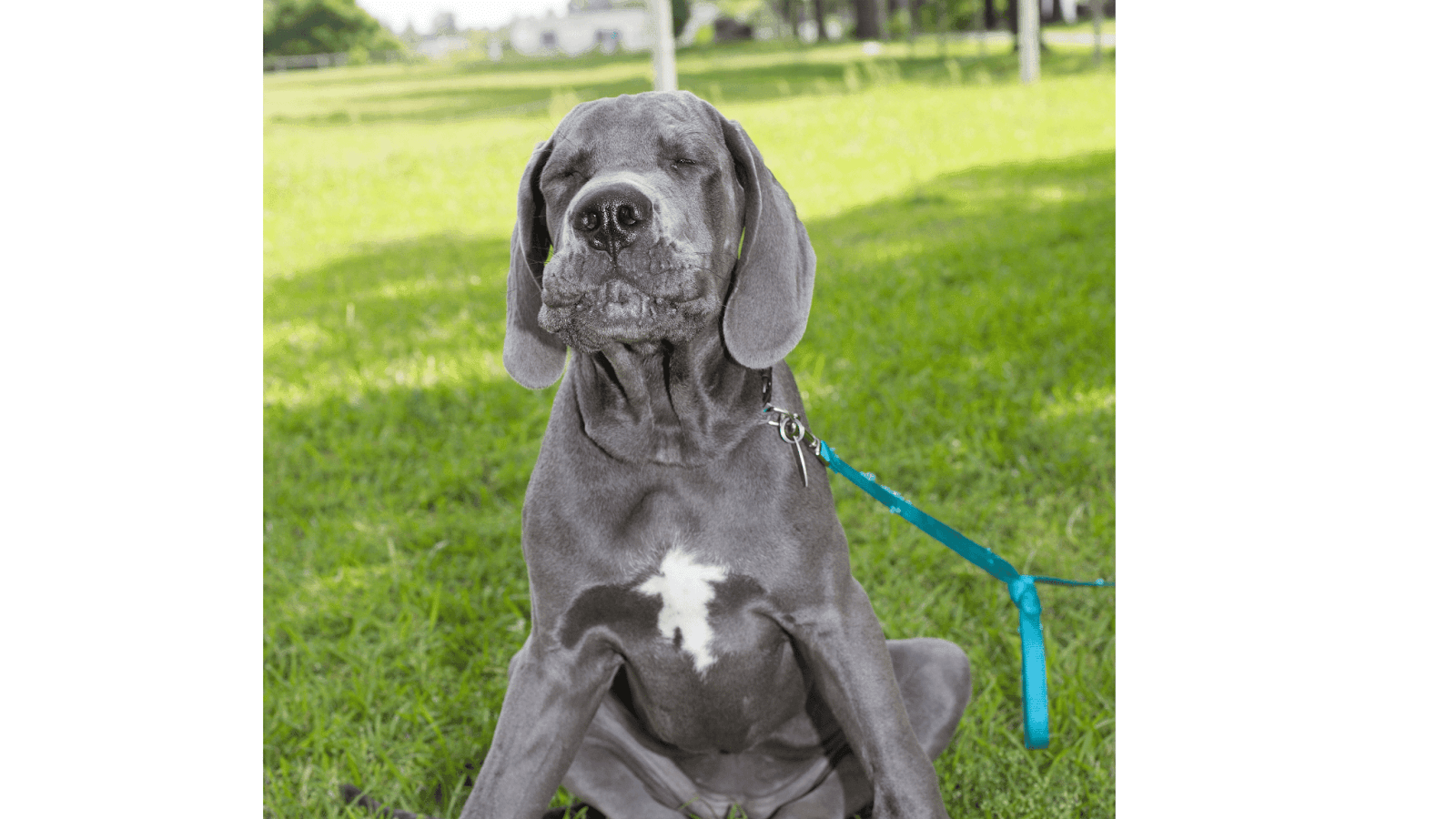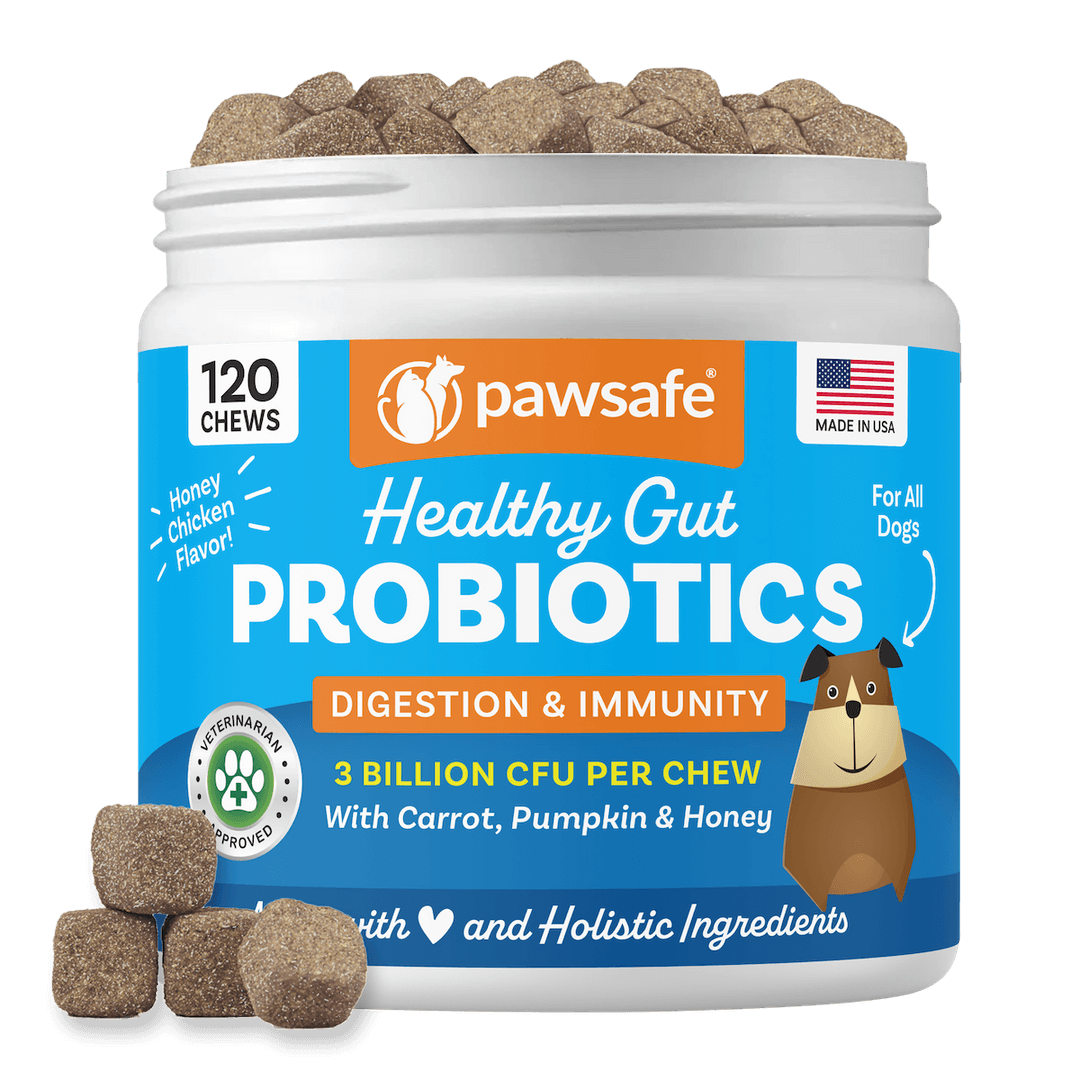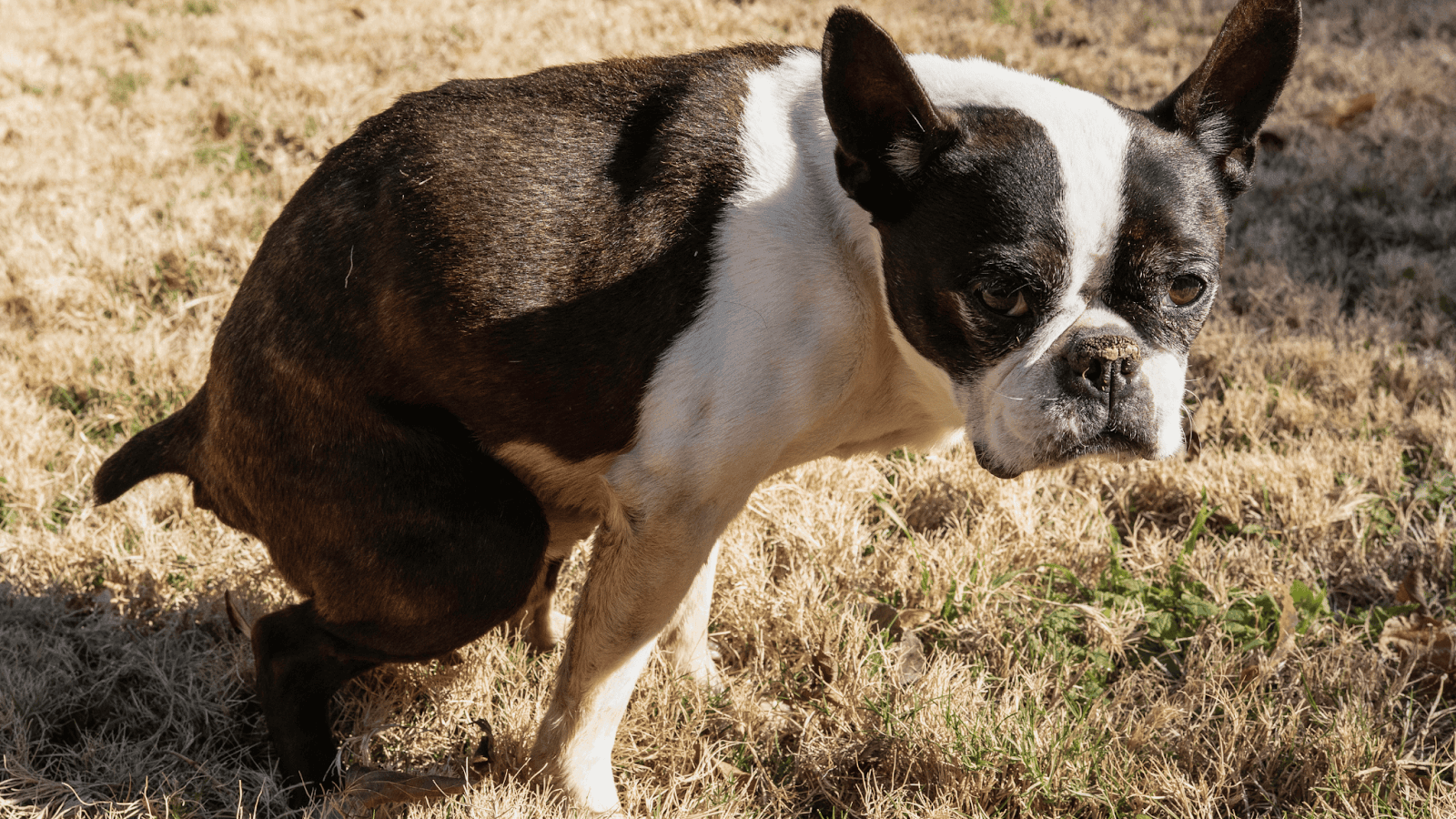
Constipation is a common problem among dogs, and it can cause concern for pet owners. If not addressed promptly, constipation can lead to more serious health issues. Therefore, knowing what to give a dog for constipation is important.
Several things can cause constipation in dogs, including inadequate fiber intake, dehydration, and lack of exercise. While some cases of constipation can be resolved with simple home remedies like probiotic chews, others may require medical attention.
Researching and consulting with a veterinarian before administering any treatment is important to ensure that it is safe and effective for the dog’s specific condition. In this article, we will discuss some of the common remedies and treatments that can alleviate constipation in dogs by consulting expert sources, such as the work of Dr. Alice Defarges, DVM[1].
Table of Contents
So, What Can You Give A Dog For Constipation?
Alleviate dog constipation by offering half a teaspoon of psyllium husk, ensuring optimal hydration, and incorporating probiotics or kefir into their diet. Regular exercise can promote healthy digestion, while, in some cases, a veterinarian-approved laxative might be necessary. Always consult a vet for persistent or severe issues.

Constipation is a common problem for dogs, and it can be caused by various factors, including a lack of fiber in their diet, dehydration, and certain medications. Fortunately, there are several things you can give your dog to help relieve constipation.
1. Increase Fiber Intake
One of the most effective ways to relieve constipation in dogs is to increase their fiber intake. You can add fiber-rich foods to your diet, such as canned pumpkin, sweet potato, or a little psyllium husk to your dog’s food to help improve their bowel movements.
Research[2] identifies dietary fiber as an essential component of a dog’s diet and plays a crucial role in maintaining gastrointestinal health. Fiber can help regulate digestion, modulate appetite, and act as a microbial energy source through fermentation.
There are different types of fiber, and each type has unique features that can affect a dog’s health differently. For example, fermentability, solubility, and viscosity are critical features of fiber types that have clinical implications and health benefits in dogs.
Veterinary nutritionists should evaluate a diet for fiber content and the current knowledge on fiber supplementation related to common gut issues, including acute diarrhea, chronic diarrhea, constipation.
It is essential to note that dietary fiber should not be used as a replacement for veterinary care. If a dog is experiencing constipation, it is crucial to seek veterinary attention promptly. A veterinarian can diagnose the underlying cause of constipation and recommend an appropriate treatment plan, including dietary changes and fiber supplementation.
2. Provide Adequate Hydration
Dehydration can also contribute to constipation in dogs, so ensuring your dog is drinking enough water is important. You can encourage your dog to drink more water by adding a small amount of chicken or beef broth to their water bowl or providing them with ice cubes made from chicken or beef broth.
Avoid giving them too much water, which could lead to bloating and vomiting. According to studies[3], dogs should take 1 ounce of fluids per body weight. For example, if a dog weighs 5 pounds, they should take 5 ounces of fluids daily.
3. Over-the-Counter Solutions
When it comes to over-the-counter solutions for dog constipation, there are a few options available. However, it is important to note that laxatives formulated for humans can be very dangerous for animals. It is always best to consult with a veterinarian before giving any medication to a dog.
One option is MiraLAX, an unflavored laxative that can be effective for dogs with constipation. However, it is crucial to ensure that the dosage is correct for the dog’s weight. Consulting with a veterinarian is recommended to determine the appropriate dosage.
4. Prescription Medications
In some cases, a veterinarian may prescribe medication to help relieve a dog’s constipation. Prescription medications can help stimulate bowel movements or soften stool to make it easier to pass.
Some common prescription medications for constipation in dogs include:
- Lactulose: This medication is a synthetic sugar that works by drawing water into the colon to soften stool and stimulate bowel movements.
- Cisapride: This medication helps to stimulate contractions in the colon, which can help move stool through the digestive tract.
- Metoclopramide: This medication can help to stimulate the muscles in the digestive tract, which can help move stool through the colon.
It’s important to note that prescription medications should only be used under the guidance of a veterinarian, as they can have potential side effects and interactions with other medications.
5. Electrolyte Supplements
Dehydration often leads to an imbalance of electrolytes, such as sodium and potassium, in the dog’s body. Veterinary-prescribed electrolyte solutions may be administered to help restore these balances. It’s essential to use electrolyte supplements specifically formulated for dogs.
If you suspect your dog is dehydrated, seeking immediate veterinary care is vital. Dehydration can quickly become life-threatening, and your veterinarian will assess the severity of dehydration and provide the appropriate treatment, which may include intravenous fluids and supportive care.
6. Exercise
Exercise is great for dogs who are constipated. Research[4] shows that constipation is most common in dogs who are not active and who may also be overweight. By exercising your dog, you promote peristalsis, or muscle movement in the intestines that helps alleviate constipation in dogs.

Daily Support For Healthy Digestion
Multi-strain probiotic soft chews that help maintain gut balance and stool quality in an easy, tasty format.
Shop Now 👉Vet Approved Formula • 90-Day PawSafe® Promise
7. Check For Obstructions (matted fur, foreign objects, tumors, etc.)
Before attempting home remedies, you must check for any obstructions causing your dog’s constipation. This can include matted fur around the anus, foreign objects lodged in the rectum, or tumors. If you notice anything unusual or suspect an obstruction, you must immediately take your dog to the vet.
8. Dietary Changes
Aside from fiber, there are several dietary changes you can try to get your dog to poop. Adding moisture to their dry food can help, or moving them to wet food or or balanced homemade diets. Avoid too much calcium in the diet and stop feeding them bones as excess calcium can cause constipation and hard, white, dog poop.
Another reason that a dog is constipated is that they are getting a lot of protein in their diets. All meat diets are a common cause of constipation in dogs.
9. Stop Dog Eating Bones and Other Objects
Dogs are notorious for eating things they shouldn’t, such as bones, toys, and other objects. These objects can become lodged in the digestive tract, causing constipation by obstructing the gut. To prevent this, it is important to supervise your dog closely and keep any hazardous things out of reach. Make sure you visit a vet as gut obstructions may need emergency surgery.
10. Prebiotics and Synbiotics
Prebiotics are non-digestible food ingredients that promote the growth of beneficial bacteria in the gut. They are typically carbohydrates that are resistant to digestion and reach the colon intact, where they are fermented by the resident bacteria. This fermentation produces short-chain fatty acids that help regulate bowel movements and promote gut health.
On the other hand, synbiotics are a combination of prebiotics and probiotics. They provide the benefits of both prebiotics and probiotics by promoting the growth of beneficial bacteria and providing them with the necessary nutrients to thrive.
Studies[5] show that incorporating prebiotics and synbiotics into a dog’s diet can help alleviate constipation by promoting the growth of beneficial bacteria in the gut and regulating bowel movements. Common prebiotic sources include chicory root[6], Jerusalem artichoke, and inulin. Synbiotics can be found in certain dog foods and supplements.
It is important to consult with a veterinarian before introducing prebiotics or synbiotics into a dog’s diet to ensure they are appropriate for the dog’s specific needs and health conditions.
11. Add Kefir
Kefir is a fermented milk drink that is rich in probiotics, which can help improve gut health in dogs. It is also a good source of calcium, protein, and vitamins B12[7] and K2[8]. Kefir can be a great addition to a dog’s diet, especially if they are experiencing constipation.
To add kefir to a dog’s diet, introduce small amounts and gradually increase the serving size over time. Choosing plain kefir without added sugars or artificial flavors is essential, as these can harm dogs.
One way to incorporate kefir into a dog’s diet is by mixing it with their regular food. It can help improve digestion and promote regular bowel movements. Another option is to freeze kefir into small cubes and use them as a healthy treat.
It is important to note that kefir should not be used solely for constipation. If a dog is experiencing severe or prolonged constipation, it is essential to consult a veterinarian for proper diagnosis and treatment.
Adding kefir to a dog’s diet can be a beneficial way to improve gut health and promote regular bowel movements.
Understanding Canine Constipation

It is defined as the difficulty or infrequency of bowel movements, and it can manifest in different ways, such as straining, hard stools, or incomplete evacuation.
In some cases, constipation can be a sign of a more severe condition, such as slow-transit constipation, obstructions, or obstipation, which requires veterinary attention. Therefore, it is essential to understand the causes and symptoms of constipation in dogs to provide appropriate care and prevent complications.
Diet is one of the primary factors that affect bowel movements in dogs. A diet lacking in fiber or high in fat can cause constipation and other disorders[9] of the stomach and intestines.
Additionally, dogs that do not drink enough water may become dehydrated, leading to hard and dry stools that are difficult to pass.
If you have been providing your dog with enough water and they are still constipated, then lack of exercise could be the other common cause of constipation in dogs. Physical activity helps stimulate bowel movements by increasing intestinal motility and promoting waste elimination. Therefore, dogs that lead a sedentary lifestyle or are confined to a small space may be more prone to constipation.
Symptoms of Dog Constipation
When a dog is constipated, it can be difficult to tell what is happening inside their body. However, there are some common symptoms that can help identify the problem. Here are some of the most common symptoms of dog constipation:
- Straining to defecate: If a dog is trying to poop but nothing is coming out, or they can only produce small, hard stools, they may be constipated. It is often accompanied by straining, grunting, or other signs of discomfort.
- Decreased appetite: Constipated dogs may lose their appetite or eat less than usual. This is because the digestive system is not functioning correctly, and the dog may feel bloated or uncomfortable after eating.
- Lethargy: A constipated dog may seem less energetic or playful than usual because they are not feeling well and may be experiencing discomfort or pain.
- Abdominal pain: Constipation can cause abdominal pain or discomfort. The pain may manifest as whining, whimpering, or other signs of distress.
- Vomiting: In severe cases, constipation can cause vomiting. This is because the digestive system is backed up, and the dog’s body is trying to expel the waste in any way possible. This is also a sign of other underlying medical issues.
- Lack of Appetite: Constipated dogs may show disinterest in food and often sleep because they are full and bloated.
- Scooting or Dragging Their Rear End: Some dogs may scoot or drag their rear end on the ground to relieve discomfort caused by constipation.
Constipation can be a sign of a more serious underlying condition, and prompt treatment is essential to ensure the dog’s health and well-being.
What Not To Give A Dog For Constipation (Common Myths)
When treating constipation in dogs, many myths exist about what works and what doesn’t. Knowing what not to give a dog for constipation is important to avoid worsening the problem.
One common myth is that giving a dog coconut oil can help constipation. However, recent research[10] suggests that coconut oil can actually cause inflammation in the gut, which can make constipation worse. It’s best to avoid giving coconut oil to dogs with constipation.
Excessive Fiber: While adding fiber to your dog’s diet can help constipation, excessive fiber intake can lead to diarrhea and other digestive issues. Stick to recommended amounts based on your veterinarian’s advice.
Mineral Oil: Giving mineral oil to dogs for constipation is risky. It can be challenging to administer safely, and improper use can lead to aspiration pneumonia if the oil is inhaled into the lungs.
It’s also important to be careful when giving dogs over-the-counter human medications for constipation. Many of these medications can be toxic to dogs, and getting the dosage wrong can be dangerous. It’s best to consult a veterinarian before giving any medication to a dog with constipation.

Gut & Immune Support In One Chew
Targeted strains assist normal digestion while supporting natural immune defenses—simple once-a-day routine.
Shop Now 👉Vet Approved Formula • 90-Day PawSafe® Promise
When to See a Vet
If a dog’s constipation lasts more than two days, it is recommended to take them to a veterinarian. The vet will perform a physical examination and may suggest further diagnostic, like blood work, X-rays[11], or ultrasound.
Suppose the dog is experiencing other symptoms alongside constipation, such as vomiting, loss of appetite, lethargy, or abdominal pain. These symptoms could indicate a more severe underlying condition that requires immediate attention.
Additionally, if the dog has a history of gastrointestinal issues[12]%2C+and+(0.5%25)) or is currently on medication, it is essential to consult a vet before administering any home remedies for constipation. Some medications or medical conditions may worsen with specific treatments, and a vet can provide the best advice on managing the dog’s constipation safely.
Preventing Future Constipation
There are several keys to preventing your dog becoming constipated in future.
Hydration
Always provide your dog with access to clean, fresh water. Proper hydration is essential for healthy digestion.
Regular Exercise
Regular exercise is important for dogs to maintain a healthy digestive system. Exercise helps to stimulate bowel movements and promotes overall gut health. It also helps to prevent obesity, which can contribute to constipation. Regular exercise not only helps to prevent constipation, but it also has many other health benefits for dogs.
Proper Nutrition
Proper nutrition is essential for preventing constipation in dogs. A balanced diet with fiber-rich foods helps the digestive system function correctly.
Dogs should be fed high-quality food appropriate for their age, breed, and activity level. The food should contain a good balance of protein, fat, carbohydrates, vitamins, and minerals.
Regular Vet Check-ups
Regular vet check-ups are essential for maintaining a dog’s health and digestive system. During a check-up, the vet can assess the dog’s weight, body condition, and overall health. They can also check for any signs of constipation or other digestive issues.
Observe for Signs
Pay attention to changes in your dog’s bowel habits. Consult your veterinarian promptly if you notice any signs of constipation, such as straining, discomfort, or infrequent bowel movements.
Frequently Asked Questions (FAQs)

Make Digestive Care Effortless
Palatable soft chews your dog looks forward to, helping keep things regular and comfortable over time.
Shop Now 👉Vet Approved Formula • 90-Day PawSafe® Promise
How can I help my constipated dog poop quickly?
If your dog is constipated, you can help them poop quickly by taking them for a walk or increasing their exercise. This can help stimulate their bowels and promote bowel movements. You can also try massaging their abdomen or giving them a warm bath to help relax their muscles. However, if your dog is severely constipated or has not had a bowel movement in two days, it is essential to seek veterinary care.
What are some home remedies for dog constipation?
Some home remedies for dog constipation include adding fiber to their diet, such as canned pumpkin or psyllium husk, and increasing their water intake and exercise. However, it is essential to consult your veterinarian before trying home remedies to ensure they are safe and appropriate for your dog.
What are some over-the-counter options for dog constipation?
There are several over-the-counter options for dog constipation, including laxatives, stool softeners, and digestive enzymes.
What are some natural remedies for dog constipation?
Some natural remedies for dog constipation include probiotics, increased water intake, and daily exercise.
Are there any safe and effective dog laxatives?
Yes, several safe and effective dog laxatives are available, including lactulose, Miralax, and docusate sodium. However, it is important to consult with your veterinarian before giving your dog any laxatives to ensure they are safe and appropriate for your dog.
Can peanut butter be used to relieve dog constipation?
While peanut butter can be used as a treat or as a way to administer medication, it is not a recommended remedy for dog constipation. Some types of peanut butter may contain xylitol[13], which is toxic to dogs and can cause severe illness or death. Peanut butter is also high in protein, and excess protein can also cause constipation. It is essential to consult your veterinarian before trying new remedies or treatments for your dog’s constipation.
Final Thoughts
In conclusion, there are several options available for treating constipation in dogs. Increasing fiber intake and providing more water can help prevent constipation from occurring in the first place. Regular exercise and consistent bathroom breaks can help keep the digestive system healthy.
If constipation does occur, mild laxatives such as canned pumpkin or stool softeners like lactulose can be effective. However, following dosing instructions carefully and monitoring the dog for adverse reactions is essential.
In more severe cases, veterinary intervention may be necessary. This can include enemas or manual evacuation of the bowel. Again, it is essential to consult a veterinarian before attempting any treatment at home. By staying informed and working closely with a veterinarian, pet owners can ensure the health and well-being of their furry friends.
References
- Constipation, Obstipation, and Megacolon in Small Animals - Digestive System. MSD Veterinary Manual. https://www.msdvetmanual.com/digestive-system/diseases-of-the-stomach-and-intestines-in-small-animals/constipation-and-obstipation-in-small-animals
- Dietary fiber aids in the management of canine and feline gastrointestinal disease in: Journal of.... Avma. https://avmajournals.avma.org/view/journals/javma/260/S3/javma.22.08.0351.xml
- Total Water Intake and Urine Measures of Hydration in Adult Dogs Drinking Tap Water or a Nutrient.... PMC. https://www.ncbi.nlm.nih.gov/pmc/articles/PMC6305449/
- Research. Co. https://www.sava.co.za/wp-content/uploads/2015/11/Understanding-constipation-in-dogs-and-cats.pdf
- (PDF) The Utilisation of Prebiotics and Synbiotics in Dogs. Researchgate. https://www.researchgate.net/publication/260963153_The_Utilisation_of_Prebiotics_and_Synbiotics_in_Dogs
- Back to the Roots: Revisiting the Use of the Fiber-Rich Cichorium intybus L. Taproots. PMC. https://www.ncbi.nlm.nih.gov/pmc/articles/PMC7360457/
- Oral Cobalamin Supplementation in Dogs with Chronic Enteropathies and Hypocobalaminemia. PMC. https://www.ncbi.nlm.nih.gov/pmc/articles/PMC4913667/#:~:text=Results,ng%2FL%3B+P+%3C+.
- Absorption of vitamin K2 by dogs after oral administration of a soft gelatin capsule formulation .... PMC. https://pubmed.ncbi.nlm.nih.gov/10678491/
- Disorders of the Stomach and Intestines in Dogs - Dog Owners. MSD Veterinary Manual. https://www.msdvetmanual.com/dog-owners/digestive-disorders-of-dogs/disorders-of-the-stomach-and-intestines-in-dogs#v3202489
- Dogs and MCT Oil: The Powerful Benefits. Dogsnaturallymagazine. https://www.dogsnaturallymagazine.com/the-health-benefits-of-coconut-oil/
- ABDOMINAL RADIOGRAPH (X-RAY) FOR DOGS. Tbeah. https://tbeah.com/blog/2018/07/17/abdominal-radiograph-x-ray-for-dogs/
- Prevalence of common canine digestive problems compared with other health problems in teaching ve.... PMC. https://www.ncbi.nlm.nih.gov/pmc/articles/PMC4774851/#:~:text=The+study+showed+that+there,13.1%25
- Koenigshof's research on xylitol toxicity in dogs. Msu. https://cvm.msu.edu/news/2015/koenigshofs-research-on-xylitol-toxicity-to-dogs#:~:text=Koenigshof+and+her+co-authors,at+a+veterinary+teaching+hospital.







